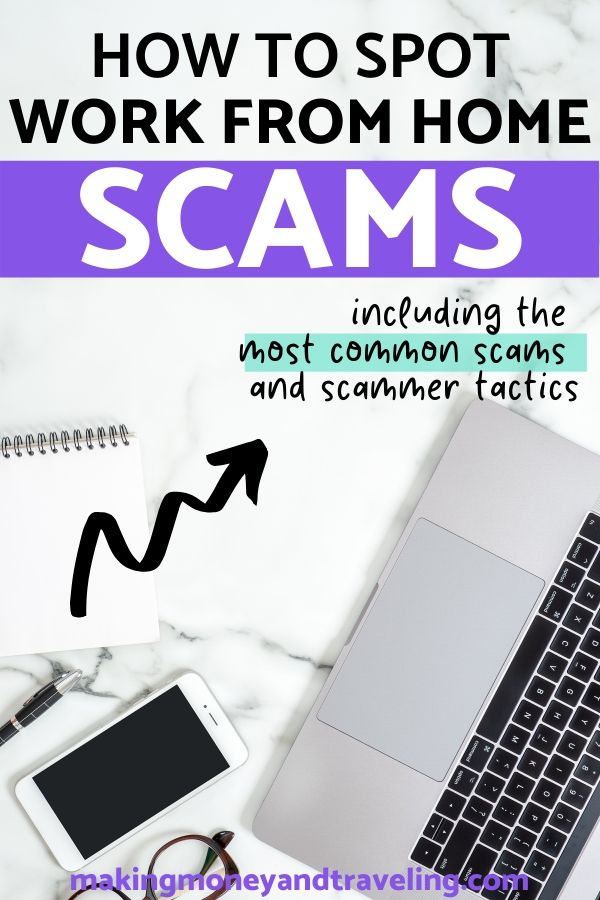Work From Home Job Scams: Don't let it happen to you!
I'm going to be honest with you:
There are a LOT of scammers out there.
Work from home job scams / remote job scams are not hard to come by.
But, there's good news.
The good news is that once you know what you're looking for, these scams are easy to spot and avoid.
But wait… there's more good news!
There are millions of legit remote jobs out there – there are more legit work from home jobs than there are scammers, and that's definitely something to take comfort in.
How to Spot and Avoid Remote Job Scams
The purpose of this post is not to scare you or make you shy away from pursuing your dream of working remotely.
I know that entering the world of remote work and online jobs can be scary for some people. It's scary because it's new and unfamiliar, but it doesn't have to be. The work from home and remote work job world is not all doom and gloom. It's not all scammers trying to steal your personal information and money. But, you do have to be smart.
I am confident that anyone can spot a work from home job scam. How? By following these tips, using common sense, and keeping a healthy level of skepticism. And after a while you won't even need these tips – spotting these types of remote job scams will become second nature.


Download this FREE ebook learn 60+ ways to earn an income from anywhere!
Sure-fire Way To Avoid Remote Job Scams
The only sure-fire method to avoid remote work and work from home scams is to use a job sourcing method that verifies it's employers.
Usually, you'll have to pay for a job-search resource that weeds out the spam for you, like FlexJobs. Use code NOMAD for up to 30% off a FlexJobs membership.
Of course, not everyone wants to pay for a job-search platform, and I totally understand that. So here are the best ways to avoid remote-work scams:
Use Your Head
When you come across or are offered a remote work opportunity, think about it from a business perspective. Especially if they are offering you a ton of money for little work.
How would the business make money if they paid you so much to do so little?
When spotting remote work scams, the saying “If it seems to good to be true, it probably is” is the #1 thing to keep in mind. I have personally talked to many people who think they’re lucky, or special, or stumbled upon some golden opportunity – no matter how much I told them to stay away, they clung to that hope. Don’t be naive.
Don’t be naive
Following up on my last point, scammers tend to play on people’s emotions and desires, and there are few things in this world that can make someone more emotional than MONEY.
The desire for money and a location-independent job can sometimes make you feel desperate and scammers know this.
When you are desperate, you don’t always make logical decisions. Be very wary of things that promise you a lot of money, a too-good-to-be-true opportunity, or telling you that you “deserve” something.
Don't be naive and don't allow yourself to be persuaded because of your emotions.
Find out the name of the company
Some job listings don't list the name of the company. It is important to find out the name of the company in order to research and see if they are legit.
If the recruiter or hiring manager tells you that they cannot disclose that information because they’ll lose a commission for hiring you, it’s a scam. A legitimate job offer will never withhold crucial information like the name of the company.
You can take it a step further and contact the business directly to verify that the recruiter is a real person working for them and that the job is real.
[elementor-template id=”2450″]
Put your detective cap on
When you are searching for remote jobs, be wary of everything you see.
I’m not saying this to be pessimistic. There are millions of legit remote work jobs out there, way more than there are scams. I’m saying it because the more wary you are of something, the more research you will do on it.
Even if a job looks legit, research the heck out of it. Find out the company name if it’s not listed. Find out their address, see if you can find them on social media.
See if they have a LinkedIn profile, and, more importantly, if any people on LinkedIn list the company as their “employer”. Try to connect with employees on LinkedIn.
Search Google for any reviews of the company, and see if they’re backed up by any organizations like the BBB (Better Business Bureau) or if they have employee reviews on Glassdoor.
Do a Google search for “Company name scam” or “Company name review”.
If you are in any work from home Facebook groups, search the groups for mentions of the company, or post and ask for personal experiences.
Check out their website. Does it look legit, or does it look scammy? Does it focus on the benefits of the “job” that they are offering, or does it focus on their actual business? Do they have a ton of job openings listed? That's another red flag.
Do not send money
While there are a few legit online jobs that will ask you to pay for a criminal background search, be vary wary of any remote work opportunity that asks you to send money. Never send money without first verifying that the company is legit.
Question Communication Methods
When looking for remote jobs, it’s obvious that everything is going to be done online.
When communicating with a recruiter or hiring manager for an interview process, communicating only through email or instant messenger is a big red flag.
Any legitimate company will want to conduct a video conferencing interview with you, or at the very least a phone call.
If you are doing a job search on a platform like Upwork and they ask you to move the interview to Skype – watch out. Upwork has their own chat and conferencing software built-in, so if a client asks you to move off the platform, it’s a red flag.
Ask questions, lots of questions
Be sure to ask questions early and often – especially if you’re questioning the legitimacy of a remote work job posting.
Ask about the exact details of the job and what will be expected of you. Ask how the company makes money. Ask how you will earn money, and how and when you will be paid.
If the only way you earn money is by recruiting people, stay away.
Ask where the home office is located – this is a good one to help you research if they are legit.
If the answers to any of these questions seems fishy and you can’t find reviews from other people, stay away.
10 common remote job scams:
- Direct sales or MLM
- Anything that involves a “personal assistant” cashing checks or wiring money or cashiers checks – avoid these ALWAYS.
- Becoming a product re-seller or wholesaler
- Pyramid Schemes
- Mystery Shopping
- Advertisements about starting your own online business and earn thousands per month (unless this is something you actively seek to do, it’s a scam)
- Assembly or craft work at home for companies to buy
- Envelope stuffing
- Unsolicited job offers – these are job offers that are emailed or DMed to you without you applying for them.
- Survey schemes – these types of job offers ask you to pay money to get access to surveys to take that will then pay you… While it is true you can earn a bit of money from doing online surveys, you should find them through reputable websites and not in a “job” offer. Filling out surveys is not a legit job.
Avoiding work from home job scams
When searching for a remote job, use job boards and job search engines, like Flexjobs. Don’t click on work from home job advertisements on Google, and don’t reply to unsolicited job emails or messages on social media platforms or LinkedIn. Don’t agree to an interview conducted by chat or messenger.
Spotting Scammer Tactics
Remote job / work from home scammers are very smart and very tricky, but there are common themes to look out for:
- The job or recruiter is asking for personal financial information like your social security number, bank account, date of birth, address, phone number, etc. early on in the process of connecting with them.
- The job pays a lot of money for very little work. If it seems too good to be true, it is.
- The company promises a get-rich-quick opportunity, or showcases other employees who have made a ton of money working for them
- The post has grammatical or spelling errors, doesn’t seem professional or written by a native english (or whatever language you’re looking in) speaker
- The contact email address isn’t a professional email (THIS IS A BIG ONE). For example, instead of “jane@companyname.com” their email address is “janedoe345218@gmail.com” OR – and this is where it gets tricky and thorough research is important – they mimic a real company’s email address like “janesmith@microsoftcomputersoftware.com”. While this may look like this person works for Microsoft, a quick Google search shows that this website isn’t even registered. Be smart, even if it looks legit. And NEVER click a link in an email until you verify that the sender is legit – this is a common phishing tactic.
- The recruiter offers you a job immediately without verifying experience or references
- The job requires you to pay up front
- Your pay is dependent upon recruiting people
- The product or job has celebrity endorsements
- The job listing uses words like “unlimited earning potential” “free work from home job” “quick money”
- The hiring manager or recruiter is pushy and impatient or offers you a job immediately
- The job description is full of fluff or very vague
Tips for finding a legit remote job
There are millions of legit remote jobs out there, and with persistence, you will find one that is a fit for you. Check out this article to learn how to find a remote job in 2020, even as a beginner.
Use a job search platform like FlexJobs
I recommend Flexjobs for several reasons. I have personally used Flexjobs and I find the platform to be incredibly valuable, and most importantly: scam free.
First of all, Flexjobs has a real person hand-screen every single job opportunity – that means there are no scams on Flexjobs.
Second, almost every single job on Flexjobs can be done remotely. You'll find freelancing jobs, entry-level jobs, remote jobs for beginners and full or part-time employment with legit companies.
You can see some jobs for free, but in order to apply you'll need to become a Flexjobs member. Click here to check out the remote jobs on Flexjobs for free.
This is because they spend so much time making sure they only provide legitimate job offers – the entire platform was started to help people avoid remote job scams.
Exclusive Flexjobs promo code
I reached out to Flexjobs to see if I could get a discount on the sign-up price for my readers… and they obliged!
When you sign up for Flexjobs, use promo code NOMAD for up to 30% off.

Do your research
Do your due diligence. Know the company, know the job expectations, how you will earn money and how you will get paid. Don't be afraid to call out a scam, and don't let emotions get the best of you. If it seems too good to be true, it is.
Use common sense and trust your gut
Trust your intuition. Don't get emotionally attached to the idea of lots of money and success. Don't think you have stumbled upon a golden opportunity. If it looks like a scam and acts like a scam, it's a scam.
Use Your Network
In addition to using legitimate job search sites like Flexjobs, network with your community of friends and family.
I have gotten the majority of my freelance clients from networking with friends and in groups that I'm a part of on Facebook. When I was just starting out, I would have never guessed that my most loyal clients would be my friends and acquaintances.
Let it be known on your social media pages that you are looking for remote work. Showcase your expertise. Network with your connections on LinkedIn and see if you can help them in any way.
While your friends might not need your help, they might know somebody that does. Never underestimate the power of your network.
Opportunity comes from the most unexpected places.
Create your own job
The internet offers really unlimited possibilities when it comes to making a location-independent income.
Some people feel more comfortable being employees of a company. They like the idea of a steady paycheck and corporate benefits like health insurance and 401k.
For others, the whole point of looking for remote work is to have more freedom and not be tied down by a set schedule or income caps. This section is for those people.
Creating your own job isn't as crazy as it might sound. Some examples of “jobs” that you can create are:
- Starting a freelancing business
- Affiliate Marketing
- Blogging
- Writing and selling ebooks and courses
Creating your own job isn't something that happens overnight. This is something that will take time and effort before you ever see money from it. But, it can also be one of the most flexible and rewarding ways of earning an income.
Avoiding remote job scams and finding remote work
These helpful tips will surely help you in learning to spot work from home and remote job scams.
It may seem intimidating at first, but once you get the hang of spotting them, it will come as second nature.
Have you come across a remote job that you still can't figure out if it's a scam? Leave me a comment below, and I will look into it for you and tell you what I think.
Was this article helpful? Pin it to Pinterest for reference! (and it really helps me out) 🙂


Carrie Wilder
Carrie has a passion for location independence and nomadic lifestyles. After traveling full-time in an RV and living the van life, she created Making Money and Traveling to help others make the switch to a remote lifestyle. Learn more about Carrie on the About page or connect on social media below.
Download this FREE ebook learn 60+ ways to earn an income from anywhere!


